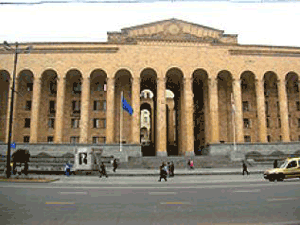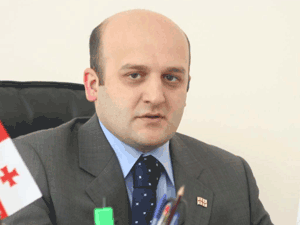Roman Apakidze
Nona Salaghaia
 The Government Started Legislative Fight against “Provocations”
The Government Started Legislative Fight against “Provocations”
The draft amendments to the law on the restriction of manifestations and granting more freedom to law enforcement officers to subdue the protest of demonstrations have become the next reason for political disagreement. The draft amendment to the law was initiated by the members of the parliamentary majority Pavle Kublashvili, Murtaz Zodelava, Kakha Anjaparidze and Lasha Todia. They aim to introduce changes to three laws and the overall goal of those changes is to restrict the right to protest. The experts say the initiative seems to be a result of the recent experience of the current government.
Demonstrators or Provocateurs
“Recent active demonstrations created discomfort for the government. The forms of protest, which were used by the demonstrators, were not quite pleasant for governmental officials,” said Manana Kobakhidze, director of the non-governmental organization “Article 42 of the Constitution”, in her interview with the Human Rights Center. She thinks the initiative demonstrates that the government is trying to create a basis to dismantle the unacceptable demonstrations.
Government officials have made statements regarding the opposition rallies since April 9 and have assessed them as provocative. Consequently, the demands of the demonstrators have been ignored by the authority. When the government treats the participants of the rally simply as provocateurs, their demands will not be considered.
Similar polarization of the situation resulted into some clashes between the policemen and demonstrators. It must be pointed out that the policemen used excessive force against the protesters.
Old and the Proposed New Law of Georgia on Police
The old law provides a specific list of weapons that the police may use. It does not contain a “catch-all” provision that allows the police to use other weapons similar to those on the list. And there is no general rule of interpretation of Georgian statutes that would supply an argument that weapons similar to those on the list may be used. The new law would expand greatly the weapons the police may use by including in permitted weapons “non-lethal weapons.”
The most prominent example of the effect of the proposed change in the law is illustrated by the demonstration on May 6. During the dispersal of protesters the law enforcers used against people a weapon that is a non-lethal weapon but is not on the list in the old law. That weapon was plastic bullets. As a result of the use of these plastic bullets several demonstrators were injured, two of them lost eyes.
Current legislation, Article 12 of the Law of Georgia on Police lists the weapon that can be used by the police: they are – hand-cuffs, rubber truncheon, tear-gas, light-sound equipment for psychological impact, anti-obstacle and anti-transport machines, water cannons, armored cars and other special vehicles, special paint, dogs and horses, electro-shock equipment.
Neither the specific weapon of plastic bullets nor the general category of, non-lethal weapons is on the list. That means on May 6, and other days, the police broke the law when they used plastic bullets or other unlisted non-lethal weapons against demonstrators. Although the Ministry of Internal Affairs confessed that non-lethal weapons had been used, nobody was punished for that.
After the legislative changes are adopted the general category “non-lethal weapon” will be inserted on the abovementioned list. One of the initiators of the draft-amendments to the law is MP Pavle Kublashvili. He said the police did not breach the law by using non-lethal weapon on May 6 because the law allows the usage of those special sources that are not prohibited by the international norms.
Davit Managadze, a lawyer for the Human Rights Center, says that this argument is not correct. He asserts that the police can use only those weapons on the list of permitted weapons and added that in accordance to the current legislation “a policeman cannot apply any method of physical oppression or special sources, even if on the list, that will result in the injury of a person, or is connected with unreasonable risk or is prohibited by the international convention and norms.” Managadze recalled those two citizens who lost eyes because the police used plastic bullets, an unlisted non-lethal weapon but a weapon that will result in injury and is connected with unreasonable risk.
Managadze thinks that the introduction of amendments to the Law on Police aims to justify the crime committed by the Georgian law enforcement bodies. “Today, introduction of amendments to the law can regulate the usage of rubber bullets or/and nets in future but it cannot justify its usage in the past because the law does not have retroactive power,” said the lawyer.
Old and New Law of Georgia on Assembly and Manifestation
After the amendments are adopted, the “artificial,” “purposeful” blocking of streets and pavements by demonstrators or some other means – cars and various constructions - will be prohibited.
Pavle Kublashvili stated: “In the future, if streets are blocked with cells or some other constructions, we will react to it in accordance with the law and law enforcement bodies will take corresponding measures.” His statement shows that the initiative resulted from the recent “unpleasant” experience of the government.
 According to the draft-law, “complete blocking of the pathway for people and partial or complete blocking of the driveway shall be allowed if the number of demonstrators is so large that the organizers cannot hold the manifestation in another place. Pathway for people or driveway can be completely or partially blocked when it is required by the number of demonstrators.”
According to the draft-law, “complete blocking of the pathway for people and partial or complete blocking of the driveway shall be allowed if the number of demonstrators is so large that the organizers cannot hold the manifestation in another place. Pathway for people or driveway can be completely or partially blocked when it is required by the number of demonstrators.”
In addition to that, according to the draft-law, the demonstration “shall be stopped immediately after the authoritative representative of the local self-governmental institution demands it.”
Representative of the Public Defender’s Office Vakhushti Menabde stated: “It is unclear who will estimate that the number of people gathered in the demonstration complies with the requirements of the law when people can block the street.” That lack of clarity may not be important, because every authoritative representative of the local authority will have the right to dismiss the demonstrators in any case.
It must be taken into consideration that the governmental officials, leaders of opposition parties and journalists will never agree on the number of demonstrators and it often is reason for political speculations.
Vakhushti Menabde assesses that these concrete amendments do not comply with the Constitution of Georgia. “According to the Constitution, blocking of the pathway or driveway during a demonstration does not depend on the number of demonstrators. According to the Constitution, preliminary notification shall be sent to the corresponding governmental institution. It makes no difference whether 10 people or 100,000 people take part in the rally-everybody has the right to free expression,” he said.
Old and New Administrative Code
The main proposed change in the Administrative Code is the proposed increase of permitted administrative imprisonment from 30 to 90 days.
Lawyer Davit Managadze thinks that this is legislative nonsense. “The point is that the Criminal Procedural Code allows two-month pretrial imprisonment while an administrative crime is a minor crime and longer punishment for a lesser offence is incorrect,” said Managadze.
Vakhushti Menabde from the Public Defender’s Office thinks that the proposed amendments to the Administrative Code, as well as the draft-amendments to the law, “aim to complicate the organization of demonstrations. The imposition of astronomic fines is nothing more than threatening the people who want to protest the regime.”
According to the amendments, a demonstrator, who breaches the rule on assembly and manifestation will be fined 1,000 GEL; an organizer of an illegal manifestation will be fined 5, 000 GEL. According to the amendments, various slogans, paintings and symbols shall not be made on the facades of administrative buildings or near them; as well as on the pathway and driveway. Similar offences will be fined 500 GEL.
Experts Talk about the Real Reasons for Legislative Changes and the Presumed Results
Manana Kobakhidze, director of the NGO “Article 42 of the Constitution”, thinks that the government tries to reduce the number of rallies through these changes. “I think, first of all, the government will manage to succeed in the reduction of the number of manifestations because according to the draft-law fines are too large and it will increase the protest of the population that will lead us to more political prisoners.”
Davit Managadze said “toughening of the law will not reduce number of crimes; just the opposite, the international experience shows that similar activities lead us to the criminalization of more people.”
Compliance
Regarding the compliance of the legislative initiative with the international norms, Vakhushti Menabde from the Public Defender’s Office said that “there is no compliance with the international law of human rights.”
“The draft law directly contradicts the international agreements that were signed and ratified by Georgia,” said Manana Kobakhidze.
Davit Managadze particularly stresses the issue that one of the authors of the initiative, MP Pavle Kublashvili, speaks about the rally on May 6. The MP said “The police did not breach the law by using non-lethal weapon on May 6 because the law allows them to use special sources that are not forbidden by international norms.”
Managadze said “all repressive law (including the Law of Georgia on Police) provides the norms and procedures that shall be implemented and misuse of any article is punished by the law. Although the Law on Police does not state that non-lethal weapon shall not be used against demonstrators, it does not mean that using this weapon is not a crime. The Law provides what may be done and does not purport to list what may not be done. Everything not on the list may not be one. Not a single law states that murder and thievery is forbidden but the Criminal Code of Georgia envisages punishment for these offences. The Law on Police provides an exact list of weapons that may be used by police against demonstrators. The international law does not provide groups of special means against protestors. It specifically does not expand the list provided by the law of Georgia. The international law uses the following terminology: “police shall use all measures or means that are envisaged by the national law.” Consequently, activities of the police are regulated by the Law of Georgia on Police and their action should not exceed the norms provided by this law.”
The list of the countries where usage of the general category of non-lethal weapons is legal is: Russia, Azerbaijan and Germany. Germany forbids rubber bullets while Russia and Azerbaijan allow it. We think this example how undemocratic and unwestern are the amendments that are initiated by the Parliament of Georgia and supposedly they will soon adopt them.



